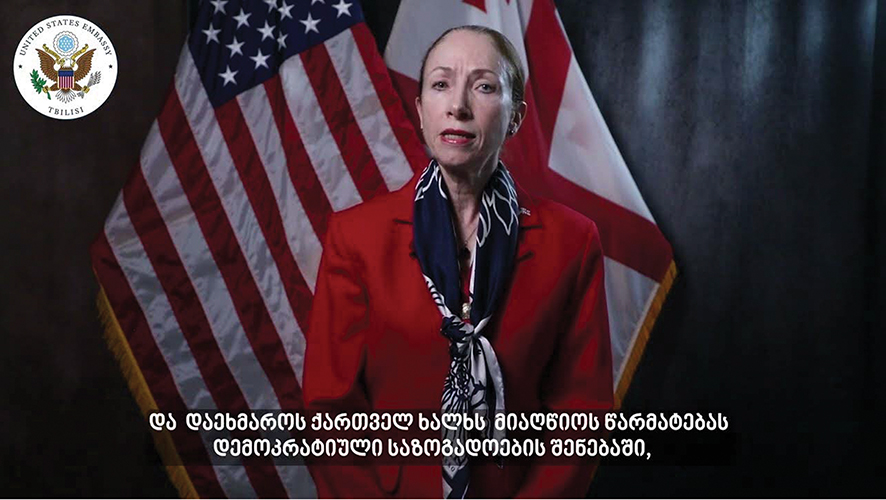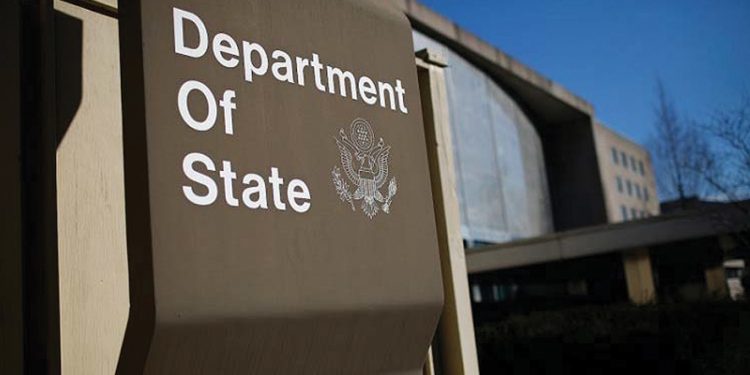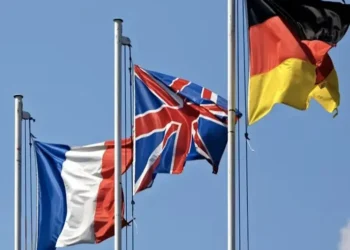In a shocking show of diplomatic force, the United States has laid down sanctions in the form of visa restrictions against four key Georgia judges. The Department of State’s head Anthony Blinken says that the action is based on credible information the judges are “involved in significant corruption.” Not only the judges, named as Mikheil Chinchaladze, Levan Murusidze Irakli Shengelia, and Valerian Tsertsvadze, but their family members as well are now forbidden from entering the US or any US territory, indefinitely.
“There is no time limit on these designations,” a statement from the embassy in Tbilisi reads. “Section 7031(c) does authorize waivers of, and exceptions that may permit an individual to travel under certain circumstances.” The statement released on Wednesday states “the judges abused their public positions by participating in corrupt activity that undermined judicial and public processes, offered benefits to and/or coerced judges to decide cases in favor of political allies, and manipulated judicial appointments to their benefit.”
However, the US will not pursue any further legal action against the corrupt judges, saying Georgia itself must do so on its own accord.
Concurrently, US Ambassador to Georgia Kelly Degnan released a video where she included information that the aforementioned individuals were found to be “offering benefits to or coercing judges to decide cases in favor of political allies and manipulating judicial appointments to their benefit.” In short, certain people in power were undermining the very rule of law in the nation.
While this may come as a shock to some, it should be of little surprise to those following the political corruption plaguing the country. Some of these judges have reportedly been linked to both accused oligarch and political player Bidzina Ivanishvili, as well as several questionable actions by the legislature to derail European Union integration efforts. Additionally, the appointment of more judges considered “friends” of the corrupt judges was not blocked but encouraged.
The steps taken by the US, while an admirable step towards encouraging Georgia along the Western path, is unlikely to have the desired effect. The complaining and smearing of US officials has already been seen from members of Georgia’s ruling elite, including ad hominem attacks against Madam Ambassador herself. Incapable of facing the proverbial music, the nation’s leadership has not and is unlikely to now face their wrongdoing and admit that they should take alternative steps.

Following riots in the streets last month that rocked the country, making headlines across the world in the process, the geopolitical trajectory of the country has come into question. Authorities in Tbilisi, previously praised for their exhaustive efforts at Western, EU, and even NATO integration, seem to have begun to undo this progress. As a result, this has led to accusations by both domestic and international observers and political figures that Georgia’s leadership is working towards a future closer with Russia.
This all comes after a significant spat between long-time ally of Georgia Member of European Parliament Viola von Cramon and several top members of the Georgian Dream party. During a visit to the capital, von Cramon noted that the “Georgian Government betrayed Georgia, betrayed its constitution, its European future, its people.” She took additional steps to declare her support for the majority of Georgians that refuse to become a part of “the Russian world.”
Unable to let the opportunity slip away, several Georgian Dream MPs, as well as Tbilisi Mayor Kakha Kaladze, and Deputy Speaker of the Parliament Archil Talakvadze, all lashed out against the MEP. Their claims alleged that von Cramon had “no desire for the development and progress of Georgia” and that she “had come to discredit Western policy.” Despite the MEP having devoted much of her personal and professional time to working with Georgian officials to help Georgia become an EU candidate state, the Georgia Dream asserted that Georgia was a country of laws.
The recent sanctions against four of the top judges in the country, with the power of many more legislators, jurists, and legal “influencers” in the nation, seem to fly in the face of these accusations against von Cramon. The country is not the hallowed beacon of European jurisprudence as Georgian Dream MPs would like to believe, but is still suffering from problems that should have been solved and shed years ago. The weaponization of law may be the single greatest roadblock to furthering Georgia’s Western ambitions.
This begs the question; what are the steps to right the proverbial Georgia ship? The obvious first phase includes the cessation of political ‘mudslinging’ between Georgian Dream and the various opposition voices in the country. The smears do nothing to promote bipartisan legislation and aid the fight against corruption, and in fact often encourage those in the ruling party to dig in deeper. While this is closer to dream than possibility, others, including Europe and the US, must be ready for the future narrative from Georgian Dream and its allies in power.
Naturally, the potential for a positive outcome in the next EU assessment of Georgian candidacy is abysmally low. These aforementioned sanctions as well as the actions of the ruling party are unlikely to encourage European leaders to vote in favor of Tbilisi’s attempts, and the resulting fallout has to be anticipated. The ruling party, based on previous rants, will assuredly be painting themselves the victims at the hands of an unfair EU and claiming that Europe doesn’t actually want Georgia.
As a result, Russia can be presented in a favorable light – the warm mother to the cold European father. While nothing could be farther from the truth, the opportunity to play the injured party cannot be missed and will be touted as a reason to pursue alternatives to Brussels. It’s at this point that the legislative bodies of the country will likely begin to disconnect from European influence. After this, sanctions will only be the first salvo.
In what could easily be called a mirror of Russia’s bastardization of the legal system, Georgia’s leading officials continue to play the games they learned from their Soviet forerunners. While one can only hope and pray that the sanctions by Washington, the critiques from Brussels, and the pleas from voices at home convince the nation’s leadership to adjust their course. In the words of AMbassador Degnan, these voices are not to simply attack those in power, but to show a “firm commitment to combating corruption and assisting Georgians to succeed in building the democratic society you so clearly want and deserve.”
By Michael Godwin














